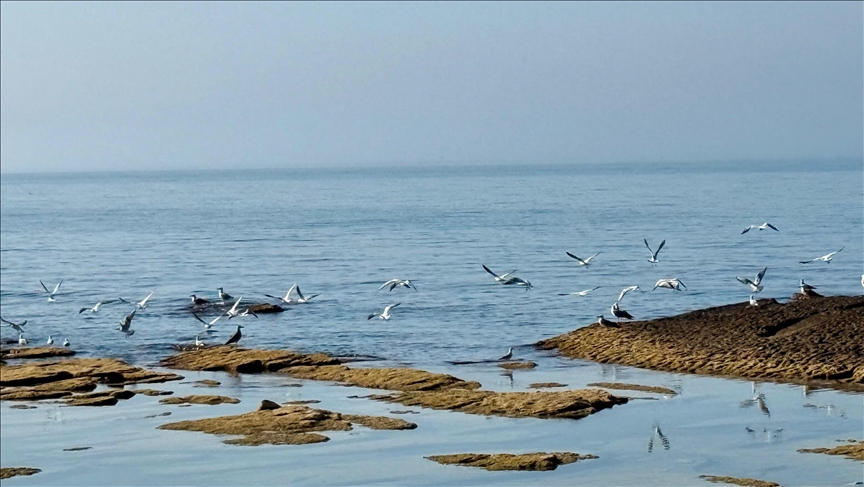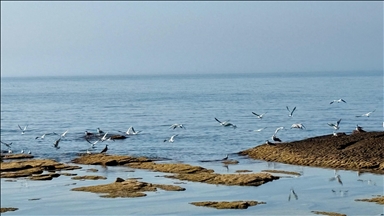Caspian Sea faces alarming decline in water levels and biodiversity
Caspian Sea continues to shrink, threatening marine life and local communities along Kazakhstan’s coast

ASTANA, Kazakhstan / ISTANBUL
Local communities and environmental activists in Kazakhstan are raising concerns over the alarming decline of the Caspian Sea’s water levels and increasing pollution, attributing the crisis to climate change, dam construction along the Volga River, regional energy extraction, and heavy maritime traffic.
Experts report that the Caspian Sea’s water level has dropped significantly over the past decade, leading to a sharp decrease in biodiversity.
Speaking to Anadolu, Save The Caspian Sea Ecological Movement founder Vadim Ni said the sea is becoming increasingly lifeless due to shallowing, pollution, and the loss of fish species.
“The Caspian Sea is largely -- about 80 percent -- fed by the Volga River. Because of declining rainfall linked to climate change and the construction of dams along the Volga, insufficient water is reaching the Caspian. This is the main reason behind the sea’s receding levels,” Ni explained.
He noted that the Caspian was once famous for its sturgeon, a prized delicacy that has now become rare.
“Caspian seals are also dying,” Ni added. “About 2,000 dead seals were found on Kazakhstan’s shores three years ago, and another 2,500 washed ashore on the Russian side. Birds are affected in a similar way.”
The shrinking and pollution of the Caspian have severely affected the daily lives of residents in Aktau, a Kazakh port city on the sea’s eastern coast.
Nurziya Satimova, a local resident and mother of two, said the Caspian has visibly retreated over the past decade.
“When I was a child, we used to swim right here where there is now no water. The shoreline has moved hundreds of meters back,” she said.
Born and raised in Aktau, Satimova expressed her wish for her children to grow up by the Caspian’s waves, just as she did.
In response to the crisis, civil society organizations in Aktau have launched various initiatives to raise public awareness about the Caspian’s ecological challenges.
A fashion show organized by the Save The Caspian Sea movement recently drew significant attention to the environmental threats facing the sea. Meanwhile, the annual “TazaFest” environmental festival, organized by the Eco Mangistau movement, has become one of the city’s most popular public events.
Jasmine Vadodaria, a 16-year-old Aktau resident, said she took part in the festival to educate locals about the dangers of plastic pollution to the Caspian’s ecosystem.
“I was born and live in Aktau, so of course the fate of the Caspian Sea matters to me. I’m proud to be part of efforts to protect it,” she said.
The deteriorating state of the Caspian Sea has not only alarmed environmental activists and local residents but also caught the attention of the Kazakh government.
Kazakhstan’s President Kassym-Jomart Tokayev, in his recent address at the 80th United Nations General Assembly, warned that the Caspian’s rapid retreat is no longer a regional issue but a global environmental alarm.
The crisis is expected to be a key agenda item at the UN Regional Climate Summit, scheduled to take place in Astana next April.
Covering about 370,000 square kilometers, the Caspian Sea is bordered by Kazakhstan, Azerbaijan, Russia, Turkmenistan, and Iran, and is recognized as the world’s largest enclosed body of water.
Known internationally as an “energy sea” due to its rich oil reserves, the Caspian is now drawing attention for a very different reason -- its shrinking waters.
Experts estimate that the sea’s level has fallen by nearly two meters over the past 20 years, posing serious concerns for Kazakhstan, which holds the longest stretch of the Caspian coastline.
Anadolu Agency website contains only a portion of the news stories offered to subscribers in the AA News Broadcasting System (HAS), and in summarized form. Please contact us for subscription options.







